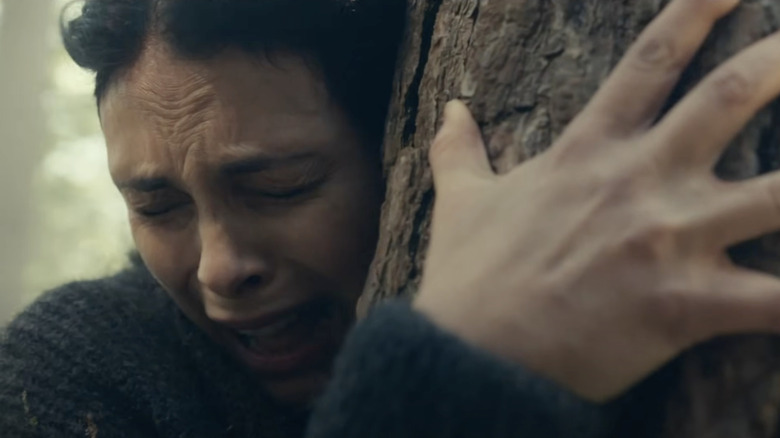Greenland 2: Migration Continues A Bleak Trend For Modern Disaster Movies
Broadly speaking, disaster movies typically end on a hopeful note. Scientists come up with solutions, Bruce Willis leads oil crews into space to drill holes through asteroids, or Dwayne Johnson helps people survive until the threat calms down and allows humanity to rebuild. It's rare to see the threat in question actually destroy the planet, which is why 2020's "Greenland" is so refreshing — it actually goes through with it. Now the sequel, "Greenland 2: Migration," is set to further explore some of the more harrowing developments from in the first movie, continuing a trend that is becoming more prominent in disaster flicks.
Directed by Ric Roman Waugh, and starring our beloved and almighty king of trash cinema, Gerard Butler, in a more somber and dramatic role, "Greenland" isn't your typical disaster movie. From the outset, we know the threat is coming, and the planet is doomed regardless, but a select few people will survive if they reach a bunker in time. "Greenland" isn't quite as bleak as, say, Zack Hilditch's (hella underrated) "These Final Hours," whose characters have zero chance of survival, but it is one of those rare mainstream disaster movies that embraces worldwide devastation as inevitable.
Since then, movies like "Don't Look Up" have reinforced the idea that some natural disasters are unbeatable, no matter how competent our scientists are. Now that we live in a post-COVID-lockdowns world at a time when environmental concerns are at an all-time high, movies of this ilk are leaning more into the doom and gloom, even as more mainstream fare still offers little modicums of hope for humanity. With that in mind, "Greenland" might've actually been more effective without a sequel about people pushing on, but "Migration" (watch the trailer above) can still be a devastating treat in its own right.
Greenland 2: Migration continues the grim journey
The disaster itself isn't the scariest thing about "Greenland." The more disturbing elements pertain to how humanity reacts to it. In the movie, Gerard Butler's character, John Garrity, and his family are selected for survival because he is a government employee, but their young son is ultimately disqualified from receiving emergency shelter because he has a health condition. Basically, the film posits the idea that if there ever comes a day when disaster befalls our planet, only the healthy, privileged few will survive. The rest of us will have to make do on our own.
"Greenland 2: Migration" explores the post-apocalyptic environment brought on by the blast from the first film, and it will be interesting to see how humanity reacts to the societal breakdown. This is a common theme in post-apocalyptic fare, but if "Migration" applies the first movie's sincerity and maturity to this type of setting, it should make for another thought-provoking — and potentially disturbing — piece of entertainment.
The "Greenland" franchise wants to scare people into opening their eyes, which is commendable. Whether you agree with their message or not, you have to respect the films for wanting to make viewers feel uncomfortable — especially when so many other disaster movies are all about having fun and sending people home feeling like everything will be fine, as the government will always protect us.
"Greenland 2: Migration" opens in theaters on January 9, 2026.
